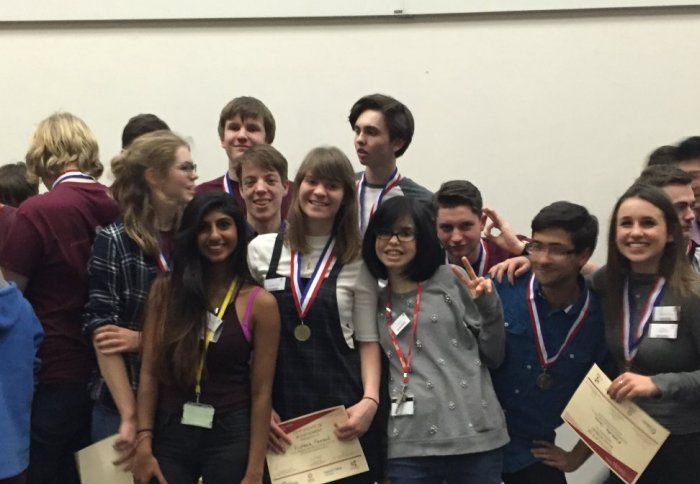Imperial College London sends school students to the NASA Space Centre!

This weekend the Department of Earth Science and Engineering hosted the two-day UK Space Design Competition (UKSDC) Final
The UK finals of the International Space Design Competition were held in the Department of Earth Science and Engineering this weekend.
There is a 50-person division of the UK space industry crammed into a seminar space on Exhibition Road. In 2076, Cassandras will take 2,500 full-time residents from Earth to Mars in 80 days – and the mission today is to construct it.
This weekend the Department of Earth Science and Engineering hosted the two-day UK Space Design Competition (UKSDC) Final; a 24-hour journey of creativity, ingenuity and team-work. Over 15 different schools from across Europe came together to make history. After a frantic first day and sleepless first night, Sunday welcomed five 35-minute pitches and grand finals.
The 2016 challenge hosted the largest ever cohort of students, speaking numerous languages and resulted in the biggest pizza bill the department has ever seen! Amidst those who have travelled from Brussels and Germany are students from Croydon and Hammersmith, from Scotland and Wales. The competition is tough: every finalist arrived as winners of a regional heat or an online video competition, where their school fought off their neighbours with their astronomical architecture. The schools joined together to form five companies, with logos, branded t-shirts and shared Google drives. Without missing a second, the potential presidents and managers rallied for their company’s support and positions of authority were decided.
There are a number of things about the UKSDC that make it unique. The teachers representing each school group attend both the regional heats and the final, supporting and inspiring not only every member of their school team but also the other staff who attend. Once the design briefs are distributed, there is really very little on-lookers can do but feed and water the entrepreneurial engineers. Within minutes of meeting, the multi-school companies have established a real sense of community and clearly defined roles. Without any effort, the cohort is gender-balanced and represents independent, grammar, selective and non-selective state schools, as well as academies, sixth form colleges and Science Clubs.
Over the years, the challenge has achieved financial support from industry, education and learned academies. The former finalists and competitors aren’t ‘lost to the system’- they end up studying STEM subjects at university and enthusiastically come back as alumni volunteers (some of the current cohort have already signed up to help next year!). Every person on every team learns from the people around them, and leaves feeling more confident, mature and resilient. They experience life at a world-leading university and interact with academics and current students, spreading their science network and building grown-up relationships with attainable role models.
We caught up with the students to find out what it was like being part of the UKSDC. These students are old beyond their years and hot on significant discoveries: they’ve been glued to the research from the LIGO detectors in Washington and Louisiana, they’re in awe of AI and they list people like Erwin Schrödinger, Oliver Sacks and Ada Lovelace as their top scientists. They’re a skilled and eloquent bunch: the majority of students are studying maths, further maths, chemistry, physics and computer science, but we’ve also got artists, philosophers, linguists and economists. They find communication, delegation and converting from imperial to metric units the trickiest parts of the competition but love “meeting people with so many different talents,” and bringing people together to “achieve a much bigger role”. It’s an education that takes them beyond their normal classroom and teaches them about the scale of international construction projects. The year 13 participants already hold offers to read physics, maths, structural, civil, mechanical, aeronautical and chemical engineering at leading universities.
On Saturday night, the teams left Imperial College at 22:00 and took over a youth hostel, likely consuming the majority of the cyber data in South Kensington. Only a few arrive at the 08:00 submission deadline with plenty of sleep and the majority are running on stellar-adrenaline. When feeding back on the presentations, the judges weren’t soft on the candidates: “not showing your designs means I don’t see them, which means they don’t exist…”. The out-of-this world (quite literally) designs included 3D printed bicycles, edible algae, maglev schools, robot butlers, robot zoos and drone-delivered dinners, and all are sensitive to contemporary human requirements. The teams deliver lively presentations despite their lack of sleep handling words like nano-repair-bots, solenoids and photo-catalysis with ease.
The expert judges represented a range of world-leading space industry. Whilst the panel saw pros and cons in each design, Rockdonnell, were crowned the unanimous victor. Rockdonnell were made up of students from Bishop’s Stortford College, Sutton Grammar School, St Lawrence College in Athens, Haberdashers’ Aske’s School for Girls and St Mary Redcliffe and Temple School. This summer, 12 of these students will represent the UK at the international finals at NASA’s Kennedy Space Center.
The programme team would like to note the generosity of their sponsors: the Royal Academy of Engineering, the UK Space Agency, the Space Science and Engineering Foundation, Dangoor Education and Imperial College London. In addition, thanks go to all the enthusiastic volunteers for their support, Jen Greenwood for administration of the programme and Dr Randall Perry and Anita Gale for their leadership.
Article text (excluding photos or graphics) © Imperial College London.
Photos and graphics subject to third party copyright used with permission or © Imperial College London.
Reporter
Melanie Bottrill
Outreach
Jessica Wade
Department of Materials